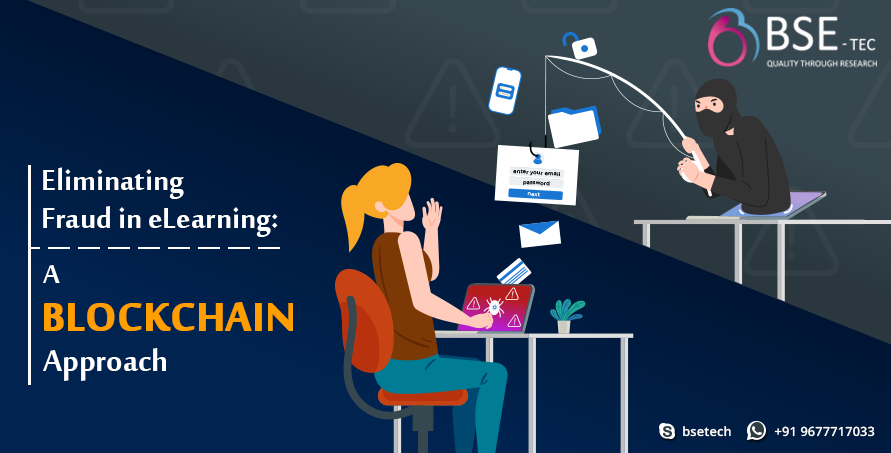Eliminating Fraud in eLearning: A Blockchain Approach

In the rapidly evolving world of online education, the need for secure and fraud-free eLearning experiences has become paramount. With the rise of elearning platforms and LMS scripts, there has also been an increase in fraudulent activities associated with education and online learning. Statistics state that from January to June 2020, the total number of unique users that encountered various threats distributed under the guise of popular online learning platforms/video conferencing applications was 168,550, a 20,455% increase when compared to the same period for 2019.
Fraudulent Activities in Education Sector
The cyber crimes around eLearning platforms have increased with the increase in the number of online classes. For example, an India-based online academy, Unacademy suffered a massive data breach, where approximately 22 million users’ private data got stolen. Cybersecurity firm Cyble revealed that the unknown hackers kept 21,909,707 user records for sale at $2,000 on darknet forums. Similarly, the Spanish eLearning platform 8belts also suffered a data breach. Here is a list of fraudulent activity stats around the eLearning sector.
DDoS Attacks
Many schools and University websites are not largely protected and are easily vulnerable to cyber attacks. For example, for each month from February to June, the number of DDoS attacks that affected educational resources out of the total number of attacks was 350-500% greater in 2020 than in the corresponding month in 2019. Cisco predicts that the total number of DDoS attacks will double from the 7.9 million seen in 208 to over 15 million in 2023.
Identity theft
Many reputed universities are now providing online degrees for students. Since online classes offer flexibility and are much cheaper than regular university classes making them a much more suitable option for working people and other students. Some individuals may attempt to take online courses or assessments on behalf of others, using someone else’s credentials or identity to gain access to educational content and certifications.
Fake Degrees
Creating fake degrees or forged certificates has made headlines for a long time. Though we have facilities like the national academic depository where employers and institutions can check the authenticity of a certificate, such crimes haven’t gone down.
Fake Universities
Scammers sometimes set up fake e-learning websites or online universities, promising certificates and degrees without any legitimate educational content or accreditation.
How can blockchain eliminate fraud in eLearning?
Immutable Records
The immutability of blockchain ensures that once a transaction, such as the issuance of a certification or the completion of an assessment, is recorded on the chain, it cannot be altered or deleted. This makes it virtually impossible for fraudsters to manipulate or forge educational records. With blockchain, learners can trust that their achievements are securely stored and cannot be tampered with, providing them with confidence and authenticity. For example, if the mark sheets of a student are stored in smart contracts and are deployed on the blockchain ledger, they cannot be altered.
Transparent Verification
Blockchain technology enables transparent verification of educational credentials, making it easier for employers and educational institutions to validate the authenticity of achievements. Authorized parties can access the blockchain and verify the records in real time, eliminating the need for time-consuming and manual verification processes. This transparency reduces the risk of fraudulent claims and enables faster and more reliable credential verification. This can be easily done with decentralized identity management.
Secure storage and Sharing
Blockchain provides a secure and decentralized system for storing and sharing educational records. By leveraging cryptographic security measures, educational institutions can ensure that sensitive information, such as personal data and grades, is protected from unauthorized access. Learners can have peace of mind knowing that their educational records are stored on a tamper-proof blockchain, reducing the risk of identity theft and fraudulent activities.
Smart contracts for Assessments
Smart contracts, which are self-executing contracts with predefined rules and conditions, can be utilized in eLearning to automate and secure the assessment process. By integrating smart contracts with blockchain, assessments can be conducted in a secure and transparent manner. The rules and criteria for assessments can be coded into the smart contract, ensuring fairness and eliminating the possibility of cheating or manipulation. This automated approach to reviews reduces the reliance on human proctoring and enhances the credibility of the evaluation process.
To combat educational and eLearning fraud, institutions and eLearning platforms are taking massive steps to mitigate cyber attacks and protect students’ private data! Get in touch with BSEtec to launch a blockchain-powered elearning platform like udemy!
Did you find this article useful? Let us know by leaving a comment below, or join us on Twitter and Facebook.




